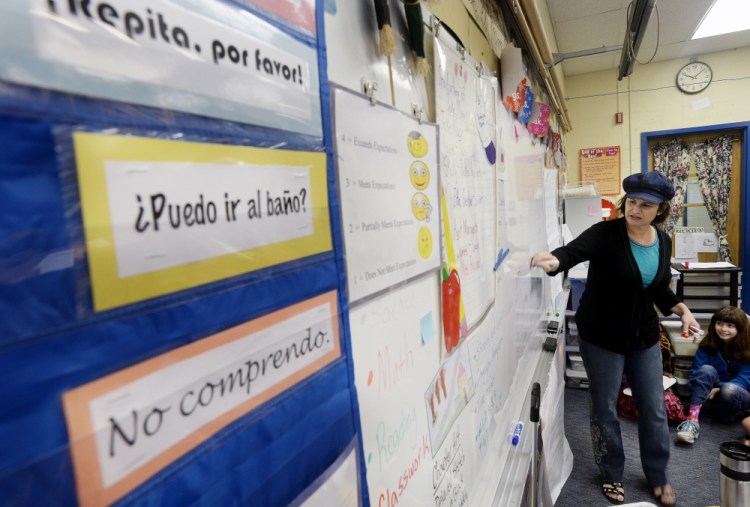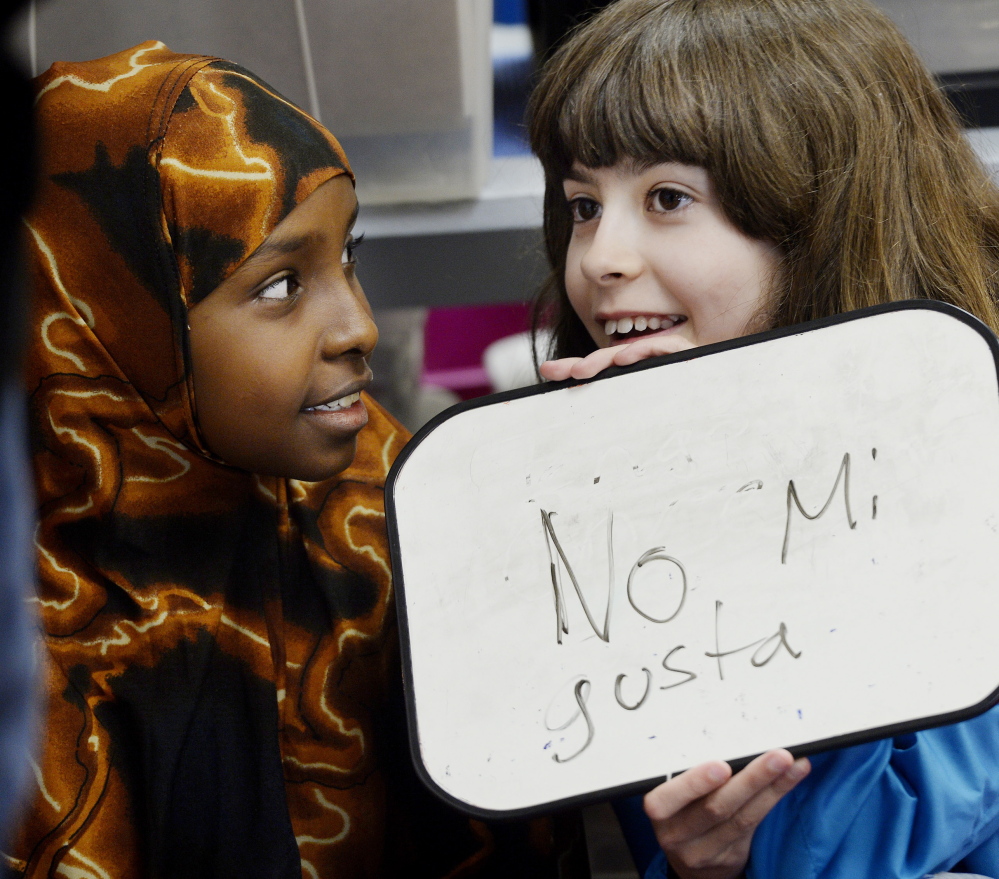Come September, expect to hear a lot more “hola, estudiantes!” at Portland’s Lyseth Elementary School, where one kindergarten class will be taught almost entirely in Spanish.
The 20 students are poised to participate in the first immersion learning program in a public school in Maine. The plan is to expand the program each year so the students will stick together as a Spanish-speaking class through fifth grade.
Experts say immersion learning is the most effective way to learn another language.
“The kindergarten-to-second grade time frame is critical. Kids at that stage are excited about it and they are able to make significant headway,” said Tara Williams Fortune, an immersion teaching specialist at the University of Minnesota’s Center for Advanced Research on Language Acquisition.
Lyseth Principal Lenore Williams said the program will help its students succeed in today’s global economy.
“Being bilingual is really something that, nationally, we’re not doing that great with, and globally that’s the norm,” she said. “There’s a gap we need to be thinking about bridging.”
The Spanish class will be one of four kindergarten classes at Lyseth Elementary School, which has about 530 students in kindergarten through fifth grade. Fifteen students have already been signed up for the class. “(Parents) really understand the value of this,” Williams said.
The students will be taught in Spanish, by a native Spanish speaker who has yet to be hired, about 90 percent of the time, with exceptions for art classes and physical education. The instruction will slowly shift to about 50 percent Spanish and 50 percent English in the fourth and fifth grades, as students need multiple teachers for math and other subjects.
Portland school officials said they have wanted to offer a Spanish immersion program for years. Superintendent Emmanuel Caulk embraced the idea when he started his job about two years ago, said Grace Valenzuela, the head of the district’s multilingual program.
Portland briefly had a similar Spanish program at Nathan Clifford Elementary School, but it was parent-backed and ended within a few years because it never got the full support of the school district, Valenzuela said.
Immersion programs for young students are increasingly popular in the United States. The first such program started in a California school in 1971, and well over 1,000 now exist nationwide, said Fortune.
While Spanish is the most common language for immersion programs, Mandarin Chinese has been increasingly popular in the last decade, jumping from about 10 programs nationally to 148 this year, she said.
In Maine, some private schools, like L’Ecole Francais in Freeport, already offer immersion instruction in a second language.
ENGLISH SKILLS GAP
Research shows that when students have lessons fully taught in a foreign language in kindergarten through second grade, their English literacy skills may be slightly delayed but the gap disappears within two years, Fortune said.
“The research is very strong and clear that those children make rapid progress, and by grade five they are at least at the (same level as other fifth-graders) and in many cases are doing better than them,” she said.
Research also indicates that students who learn a second language early become more proficient in both languages than those who learn one later in life.
Portland’s pilot program is expected to grow to 120 students at Lyseth Elementary, with six classes of 20 students each. Officials hope to expand it to other elementary schools in the district.
David Galin, the district’s chief academic officer, said the immersion program fits with the district’s goal of preparing students to live and work in a global economy. Portland offers some instruction in several languages, including Mandarin and Arabic, at other schools.
Valenzuela, who is literate in Tagalog and English, agreed.
“I know what it means to be a bilingual student,” she said. “The world opens up for you when you have that opportunity. You are given another perspective of the world.”
SUPERIOR LEARNING METHOD
Jay Ketner, a world languages specialist for the state Department of Education, said studies show that immersion is the best way to learn a foreign language, and the programs are increasingly popular.
“They certainly represent the future of foreign language learning,” he said.
Under state standards that take effect with the high school class of 2018, all students are expected to be conversationally fluent in a language other than English. Any student who doesn’t meet the language standard won’t get a diploma.
“A program like Lyseth’s is in a position to best provide students with the ability to gain proficiency in a language other than English,” Ketner said.
Portland elementary school students already get small amounts of Spanish language instruction in grades three through five, with third-graders getting about 30 minutes a week and fourth- and fifth-graders getting an hour a week.
Robin Stevens, who teaches Spanish to older elementary school students, said she’s excited that Lyseth Elementary is adding the immersion program.
“I hope it’s going to take off,” said Stevens, who hopes to have her fifth-grade Spanish students become “reading buddies” for the kindergartners.
WHY SPANISH?
Valenzuela said the district decided to offer a program in Spanish, rather than another language, because Spanish is growing as a second language in the United States.
Another factor was finding a bilingual teacher; there are more quality instructors who are fluent in both Spanish and English, she said.
“We looked at French and possibly one of the State Department’s strategic languages, such as Arabic or Mandarin,” she said.
The program’s start-up costs are minimal. The school’s current classroom materials are available in Spanish, and no additional money from the budget will be used to create the program, Galin said.
Valenzuela said the district is working with similar programs in other states to get started, including one in Massachusetts that she and Principal Williams visited.
“Looking at those kids in Massachusetts, I was struck by how fast they learned the language. These kids were engaged,” she said. “There is that rigor and challenge in learning the language, in the mental capacity to work their brains double-time.”
Noel K. Gallagher can be contacted at 791-6387 or at:
Send questions/comments to the editors.





Success. Please wait for the page to reload. If the page does not reload within 5 seconds, please refresh the page.
Enter your email and password to access comments.
Hi, to comment on stories you must . This profile is in addition to your subscription and website login.
Already have a commenting profile? .
Invalid username/password.
Please check your email to confirm and complete your registration.
Only subscribers are eligible to post comments. Please subscribe or login first for digital access. Here’s why.
Use the form below to reset your password. When you've submitted your account email, we will send an email with a reset code.